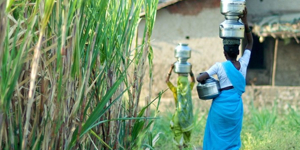Sterilization for Survival: When Weather, Wages and Wombs Collide

Introduction:
In Beed's arid sugarcane fields, Maharashtra, survival comes at a brutal price. It's an area where poverty, migration, and climate unpredictability bleed into each other, giving rise to a culture of silence. But here lies a harsh reality beneath this silence: women are losing their wombs, not by medical compulsion, but as a sacrificial offering at the altar of livelihood. This tragedy isn't shaped by a single entity but by an interplay of several factors including wages, stereotypes, climate conditions, sanitation facilities and many more.
Beed and Forced Migration
Maharashtra’s district of Beed is a drought-stricken area driven by poverty and silence. Indications such as low rainfall, low soil quality and decline in groundwater index has marked this district as the severe drought hit. Against this harsh backdrop, the exacerbated climate changes have further intensified the burden on already debt-ridden families, lack of alternative employment tracks, low crop production and correlated issues. Due to this seasonal migration is a cardinal instrument of survival with families moving to other areas for sugarcane work. Each year, as the sugarcane harvest approaches, thousands of families leave their homes in search of temporary work. Workers from Beed migrate to western Maharashtra and other regions, drawn by paltry but necessary wages. This includes women too who work alongside their husbands, 12 to 16 hours a day. But for these women, work is not only physical, it is inextricably linked to their bodies as well. And in this cruel, exploitative system, menstruation is an obstacle.
No Space for Periods, Only Penalties
With no access to sanitary products or toilets in the fields, periods are not just an inconvenience, they're a liability. The informal nature of their employment offers no safety nets, no paid leaves, no healthcare, no maternity protection. And worst of all? No tolerance for menstruation. Contractors often impose penalties or deductions if women skip work due to period pain or reproductive health issues. The solution? Surgical removal. Hysterectomy. According to a study in 2018 by the Maharashtra State Commission for Women ,it was found that 36% had undergone a hysterectomy. Most were under the age of 40.
Beliefs, Pressures, and Consequences
Another fuel to this fire is the beliefs that deems a woman’s womb useless after birth, the birth adds to the labor force, making the removal of the uterus appear justified, meant to enhance productivity. In the lack of formal education or healthcare guidance, decisions are made under pressure by families, husbands, contractors, or even quacks posing as doctors. Many women later experience chronic back pain, early menopause, weariness, and despair. However these experiences are not just physical. The physical loss is accompanied by a psychological one. For some, it represents a loss of womanhood. Others are coming to terms with the fact that they had no control over what happened to their bodies.
Climate: The Silent Aggravator
However, this is not simply a health or labor issue; it is a climate justice crisis. As the International Institute for Environment and Development (IIED) points out, Beed's rising water shortages and irregular climatic patterns are the true drivers of this periodic migration. Droughts decimate local agriculture, forcing residents to take on insecure, nomadic jobs in sugarcane fields. In this sequence of dislocation and despair, women's bodies bear the brunt of the burden. The implications are deeply gendered. Climate change is not an abstract issue. It's lived, embodied, and horribly gendered. The heat not only scorches the land, but it also undermines health, dignity, and choice.
Medical-Industrial Complex
The tale does not end with climate and labor. A closer examination exposes how private healthcare providers have capitalized on this desperation. Beed's healthcare system is dominated by uncontrolled private clinics and hospitals. With scant public facilities and low awareness among the rural poor, these clinics have turned hysterectomy into a business model. Government investigations have turned up evidence of overprescription, disinformation, and even unneeded procedures. However, systemic accountability is unusual. In this setting, healthcare has evolved into a quiet collaborator in exploitation.
Insufficient Government Response
The growing media coverage and public outrage have called for government actions. Investigations have been requested on occasion, and awareness campaigns have been undertaken in a few areas, but fundamental improvements have yet to be implemented. While the state government has launched surveys and data gathering efforts, there is a noticeable absence of rehabilitation, support programs, and healthcare improvements specific to these women. The crisis is the outcome of systemic failure and negligence. The majority of women are unregistered workers who are not eligible for state benefits or health insurance. They work long hours for low pay, with no sick leave or benefits, and are fined if they miss a day. At home, many endure domestic violence with nowhere to turn. This isn’t just poor healthcare, it's gendered violence embedded in everyday life.
A Crisis Beyond Beed
This injustice is not isolated. This is not a Beed-specific tragedy. Similar storylines spread across India's drought-prone and economically challenged areas. The pattern is hauntingly consistent: economic insecurity, a lack of healthcare, patriarchal norms, and a lack of social safety all combine to force women into irreversible decisions. How many more wombs must be sacrificed at the altar of silence and survival?
At The órb, we don’t bring you hope. We bring you what must be seen.


